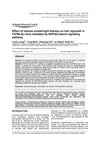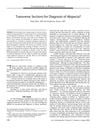 21 citations,
May 1996 in “Current problems in dermatology”
21 citations,
May 1996 in “Current problems in dermatology” Detailed patient history and physical exams are crucial for diagnosing hair loss.
 13 citations,
March 2016 in “Journal of Cutaneous Pathology”
13 citations,
March 2016 in “Journal of Cutaneous Pathology” Some people's hair loss is caused by multiple factors, with the most common being a mix of AGA and CCCA.
 12 citations,
February 2007 in “Facial Plastic Surgery”
12 citations,
February 2007 in “Facial Plastic Surgery” Hair transplantation techniques have improved over 12 years, with follicular unit grafting providing more natural results and potential future advances in automation and genetics.
[object Object]  9 citations,
October 2012 in “Frontiers of Hormone Research”
9 citations,
October 2012 in “Frontiers of Hormone Research” Antiandrogens are the main treatment for hirsutism, with individualized care and safe, affordable options needed.
 8 citations,
May 2017 in “Chinese Journal of Integrative Medicine”
8 citations,
May 2017 in “Chinese Journal of Integrative Medicine” Miscanthus sinensis flower extract may help promote hair growth and prevent hair loss.
 7 citations,
September 2020 in “Journal of Cosmetic Dermatology”
7 citations,
September 2020 in “Journal of Cosmetic Dermatology” Minoxidil and Finasteride are the most popular hair loss treatments, with rising interest in other options, and economic or health crises can change what treatments people prefer.
 6 citations,
November 1988 in “Journal of the American Academy of Dermatology”
6 citations,
November 1988 in “Journal of the American Academy of Dermatology” The document concludes that hair analysis is not good for assessing nutrition but can detect long-term heavy metal exposure.
 1 citations,
April 2024 in “Journal of Pharmaceutical and Pharmacological Sciences”
1 citations,
April 2024 in “Journal of Pharmaceutical and Pharmacological Sciences” The mouse models are effective for testing new hair loss treatments.
 1 citations,
August 2020 in “Food Research”
1 citations,
August 2020 in “Food Research” Plant extracts like Avicennia marina, Boehmeria nipononivea, and Camellia sinensis could potentially treat hair loss with fewer side effects than synthetic drugs.
 1 citations,
May 2018 in “Tropical Journal of Pharmaceutical Research”
1 citations,
May 2018 in “Tropical Journal of Pharmaceutical Research” Intense pulsed-light therapy helps mice grow hair by activating a specific growth pathway.
 343 citations,
October 2015 in “Endocrine Practice”
343 citations,
October 2015 in “Endocrine Practice” The guide recommends specific methods for diagnosing PCOS and various treatments for its symptoms, while considering the health impacts on adolescents.
 160 citations,
January 2009 in “Clinical Drug Investigation”
160 citations,
January 2009 in “Clinical Drug Investigation” HairMax LaserComb® effectively promotes hair growth and stops hair loss in males with androgenetic alopecia, with no serious side effects.
 76 citations,
January 2007 in “American Journal of Clinical Dermatology”
76 citations,
January 2007 in “American Journal of Clinical Dermatology” Women with PCOS often have skin problems like excessive hair, acne, hair loss, and dark patches, which can be treated with hormonal and non-hormonal therapies.
 32 citations,
November 2012 in “Aesthetic Surgery Journal”
32 citations,
November 2012 in “Aesthetic Surgery Journal” Hair restoration surgery has advanced, focusing on natural results and may improve further with new techniques and therapies.
 27 citations,
December 2016 in “Dermatology and Therapy”
27 citations,
December 2016 in “Dermatology and Therapy” Certain skin conditions can indicate insulin resistance and should prompt lifestyle changes and medical treatment to manage underlying health issues.
 24 citations,
August 2005 in “The American Journal of Dermatopathology”
24 citations,
August 2005 in “The American Journal of Dermatopathology” Vertical sections are better than horizontal sections for diagnosing alopecia.
 1 citations,
March 2021 in “Current Dermatology Reports”
1 citations,
March 2021 in “Current Dermatology Reports” Various treatments help hair growth, but more research needed for safety and effectiveness.
 1 citations,
August 2013 in “Springer eBooks”
1 citations,
August 2013 in “Springer eBooks” Birth control pills and anti-androgen medications help manage hair growth, acne, and hair loss in women with PCOS.
 June 2024 in “Research Square (Research Square)”
June 2024 in “Research Square (Research Square)” Early-onset AGA shows different hair and metabolic characteristics compared to normal-onset AGA.
 38 citations,
February 2019 in “Clinical Interventions in Aging”
38 citations,
February 2019 in “Clinical Interventions in Aging” Dutasteride more effectively treats hair loss than finasteride, but may increase risk of altered libido.
[object Object]  33 citations,
August 2015 in “F1000Research”
33 citations,
August 2015 in “F1000Research” New model shows muscle affects hair loss differently in men and women.
 3 citations,
December 2011 in “Pediatric Dermatology”
3 citations,
December 2011 in “Pediatric Dermatology” The patient's long-term hair loss was caused by leukemia treatments and low estrogen levels, worsened by her genetic tendency for hair loss.

Afro-textured hair is more fragile and prone to certain scalp conditions, requiring careful treatment and more research for effective management.
 165 citations,
August 2013 in “Lasers in Surgery and Medicine”
165 citations,
August 2013 in “Lasers in Surgery and Medicine” Low-Level Laser Therapy is effective and safe for hair growth with minimal side effects.
 47 citations,
December 2006 in “Therapy”
47 citations,
December 2006 in “Therapy” The dietary supplement helped increase hair growth in women with hair loss.
 30 citations,
March 2017 in “ACS biomaterials science & engineering”
30 citations,
March 2017 in “ACS biomaterials science & engineering” Hair follicles are valuable for regenerative medicine and wound healing.
 26 citations,
January 2019 in “Expert Opinion on Investigational Drugs”
26 citations,
January 2019 in “Expert Opinion on Investigational Drugs” New treatments for hair loss show promise, but more research is needed to confirm their safety and effectiveness.
 8 citations,
October 1988 in “Clinics in Dermatology”
8 citations,
October 1988 in “Clinics in Dermatology” Current research explores hair growth drugs, while future research aims for personalized treatments.

Chrysanthemum zawadskii extract may help treat hair loss by promoting hair growth and affecting growth factors.
 7 citations,
December 2020 in “Dermatologic Therapy”
7 citations,
December 2020 in “Dermatologic Therapy” Injections with 0.5% minoxidil effectively treat female hair loss, increasing hair density and thickness.






























